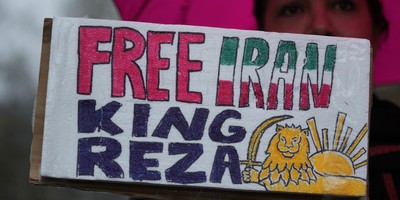The world's greatest entertainer died -- 19 years ago. His name is Sammy Davis Jr.
At Michael Jackson's memorial, Motown founder Berry Gordy called the late, incredibly talented Jackson "the greatest entertainer that ever lived." Someone once said that Ginger Rogers, Fred Astaire's famous dance partner, did everything he did -- except backward and wearing high heels. Well, Sammy Davis Jr. did everything Michael Jackson did -- and more, much more -- except during Jim Crow and with one eye.
Davis sang. He danced. He acted. He played piano, drums and trumpet. He did impressions of the popular celebrities of his time. Gifted with excellent timing, Davis wove comedy into his act, always writing or improvising his own material.

Davis, like Jackson, became the focal point in a group of entertainers -- except Davis started on the stage when he was 3 and fronted the Will Mastin Trio as a teen. He never attended school -- not even elementary school -- and grew up on the road, without his mother.
Jackson came up hard. Davis came up harder. Try reading Davis' best-selling (15 million copies) autobiography, "Yes I Can," written with his longtime friend and confidant, Burt Boyar. It tells the journey of an astonishingly gifted and successful performer, a highly intelligent, self-educated, voracious reader, a man both confident and insecure -- in an era of segregation, lynchings and civil rights marches.
Davis worked hard. Davis played hard. His personal life and decisions and excesses attracted and repelled both blacks and whites. Yet however Davis' audience may have felt about him, it could never question his unparalleled talent.
"Yes I Can" describes some of the horrific racism endured by the legendary performer. For example, during World War II, Davis served in one of the Army's first integrated units. Once, some white members of his unit surprisingly invited Davis, sitting alone in a bar, to come over and join them for a drink. One of the guys handed him a beer. Suspicious, Davis refused to drink it. Good thing. The liquid in the mug was not beer, but urine.
Recommended
During the Jackson memorial, we heard how he brought people of different races together. While Davis headlined at The Sands in Las Vegas in the late 1950s, the NAACP threatened a strike against the casinos because they wouldn't hire blacks in more prominent, visible positions. Davis told The Sands' president, Jack Entratter, "You've got to hire more blacks up front, not hidden in the kitchen." Entratter copped out, deferring to racist owners and high rollers. Davis told him, "Then you'll be embarrassed, because I'll be right out front picketing with them." Entratter gave in, and The Sands was not struck. Davis also marched for civil rights in places like Selma and the 1963 March on Washington.
He vigorously campaigned for John F. Kennedy in 1960. At the time, Davis -- despite the danger to his career, if not his life -- was engaged to white rising-star actress May Britt. To avoid alienating voters, Davis postponed their wedding until after the election. His reward? The newly elected President withdrew Davis' invitation to the inaugural to appease those offended by the recently married high-profile interracial couple. And 20th Century Fox, to which Britt was under contract, invoked the morals clause and let her go, effectively ending her career.
A brief word about Jackson's "moonwalk." Davis performed that move -- a derivative of soft shoe -- in front of audiences long before Michael was born. Indeed, young Michael frequently visited the Davis' home to watch tapes of Davis dancing and performing. As Davis told his friend Boyar: "It's such a gas when the kids like what you do enough to copy you. It's so flattering."
Before a show, Davis would pick out his first couple of songs, and then, after getting a feel for the audience, he would ad-lib the rest -- comedic patter, songs, impressions, playing the trumpet -- sensing what the crowd wanted. Boyar once accompanied Davis to a gig where the entertainer's band failed to show. "What are you going to do?" asked Boyar. Davis replied, "If I can't go out there with a comb and tissue paper and entertain those people, then I'm not the entertainer people say I am." Davis literally went onstage with a comb and tissue paper, captivating the audience for more than two hours. He did it, as always, without choreographers, directors, backup dancers or comedy writers.
Severely injured in an automobile accident, Davis lost one eye. He performed for a while with an eye patch and then with a glass eye for the rest of his career. He never missed a beat.
He portrayed a boxer in the Broadway play "Golden Boy," receiving a Tony nomination for Best Actor in a Musical. He also appeared in numerous television shows -- receiving several Emmy nominations and one win -- and movies, including the original "Ocean's Eleven."
A photographer, Davis captured fascinating shots of the famous -- Marilyn Monroe, Frank Sinatra, Jerry Lewis -- and the not-so-famous, of the rich and of the poor. (See Boyar's coffee-table book, "Photo by Sammy Davis, Jr.," a remarkable collection of pictures taken by Davis.)
No disrespect to Michael, but come on, Sammy is in a class by himself.
























Join the conversation as a VIP Member